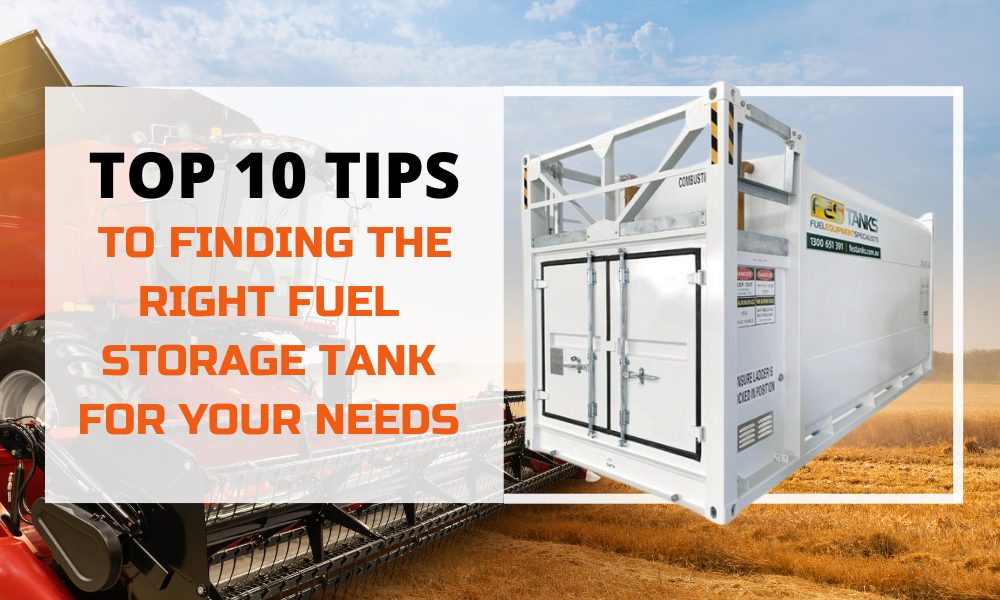Whether you’re running a small-scale operation or managing a large industrial site, selecting the right fuel storage tank is crucial for safety, compliance, and cost-effectiveness. With an array of options available in the market, finding the perfect fit can be overwhelming.
However, armed with the right knowledge and guidance, you can navigate through the process seamlessly. At Genset Hire and Sales Australia (GHASA), we have over 40 years of experience and have developed this comprehensive guide where we take a closer look at essential tips and factors to consider when finding the right fuel storage tank tailored to your specific requirements.
Tip 1: Assess Your Requirements
Before diving into the plethora of options available, take a step back and assess your needs. Consider factors such as the type and volume of fuel you need to store, the intended location for the tank, environmental regulations, and your budget constraints. A clear understanding of your requirements will serve as a roadmap in your search for the ideal fuel storage solution.
Tip 2: Material Matters
Fuel storage tanks come in various materials, each with its own set of advantages and considerations. Common options include steel, fiberglass, and polyethylene. Steel tanks are durable and suitable for aboveground and underground installations but may be susceptible to corrosion. Fiberglass tanks offer excellent corrosion resistance and are lightweight, making them easy to install. Polyethylene tanks are highly resistant to corrosion and can be a cost-effective option for aboveground installations. Evaluate the pros and cons of each material in relation to your specific needs and environmental conditions.
Tip 3: Consider Environmental Factors
Environmental factors play a significant role in determining the most suitable fuel storage tank in Australia for your site. Factors such as temperature fluctuations, soil composition, seismic activity, and proximity to water bodies should be carefully evaluated. For instance, if you’re located in a seismic zone, you may need a tank designed to withstand earthquakes. Similarly, if you’re storing fuel in a corrosive environment, opting for a corrosion-resistant material is imperative.
Tip 4: Compliance and Regulations
Compliance with local, state, and federal regulations is non-negotiable when it comes to fuel storage. Familiarise yourself with relevant regulations governing the storage, handling, and transportation of fuel in your region. Ensure that the tank you choose meets or exceeds regulatory requirements and obtain any necessary permits or certifications before installation. Non-compliance can lead to hefty fines, legal liabilities, and environmental hazards.
Tip 5: Capacity and Space Constraints
Determine the required capacity of the fuel storage tank based on your consumption patterns and operational needs. Factor in potential future growth and fluctuations in demand to avoid outgrowing your tank prematurely. Additionally, consider space constraints on your site when selecting the tank size and configuration. Aboveground tanks may require less space than underground tanks but may be subject to aesthetic considerations and zoning restrictions.
Tip 6: Accessibility and Maintenance
Ease of access for refueling, inspection, and maintenance is essential for ensuring the longevity and efficiency of your fuel storage tank. Opt for tanks equipped with accessible manways, vents, and fittings to facilitate routine maintenance tasks. Consider the availability of spare parts, technical support, and warranty coverage from the manufacturer when making your decision.
Tip 7: Quality and Reputation
When investing in a fuel storage tank in Australia, prioritise quality and reliability over short-term cost savings. Research reputable manufacturers with a track record of producing high-quality tanks that adhere to industry standards and regulations. Seek recommendations from industry peers, read customer reviews, and inquire about warranty options before making your final selection.
Tip 8: Budget Considerations
While quality should be your primary consideration, it’s essential to establish a realistic budget for your fuel storage tank project. Factor in not only the initial cost of the tank but also installation expenses, ongoing maintenance costs, and any ancillary equipment required. Compare quotes from multiple suppliers to ensure you’re getting the best value for your investment without compromising on quality or compliance.
Tip 9: Consult with Experts
When in doubt, don’t hesitate to seek guidance from industry experts, consultants, or engineers specialising in fuel storage solutions. The team at GHASA can provide invaluable insights, recommend tailored solutions, and assist you in navigating complex regulatory requirements. A collaborative approach ensures that your fuel storage tank meets your specific needs while mitigating potential risks and challenges.
Tip 10: Regular Inspection and Monitoring
Once your fuel storage tank is installed, establish a comprehensive inspection and monitoring regimen to detect any signs of wear, corrosion, or leakage promptly. Implement preventive maintenance measures, such as corrosion protection coatings, leak detection systems, and spill containment measures, to safeguard against potential hazards and regulatory violations.
Fuel Storage Made Simple with GHASA
Finding the right fuel storage tank requires careful consideration of various factors, including your specific requirements, environmental considerations, regulatory compliance, and budget constraints. By following the tips outlined in this guide and conducting thorough research, you can make an informed decision that ensures the safety, efficiency, and reliability of your fuel storage system for years to come.
Whether you’re a small-scale operator or managing a large industrial site, GHASA is your fuel storage experts. From assessing your requirements to navigating compliance regulations and selecting the optimal tank material, our team is here to guide you every step of the way.
Contact us today on (08) 9359 1988 to discuss your fuel requirements and discover why we’re the preferred choice for businesses across Western Australia. Let us help you future-proof your operations and ensure peace of mind for years to come.

